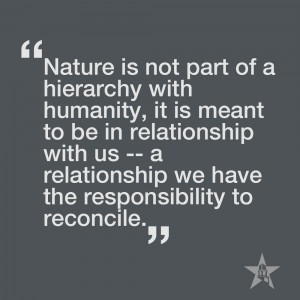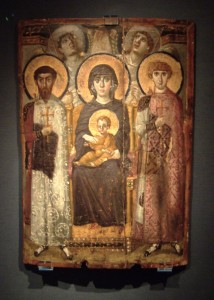I grew up in trees. I loved to climb to the highest branches during a storm to be part of their dance with the wind, or to wrap my legs around the lowest branch and swing down to see the world from a new perspective. My love for trees was so faithful that the day the Old Maple in my yard was cut down, I did not talk to my parents for the rest of the day. But, I also grew up pulling the legs off of spiders with my older siblings and making a pile of their bodies. These juxtaposing images of my childhood pastimes illustrate the conflict between my appreciation and relationship with the earth, and a learned posture of entitlement over the created world.
 My posture of entitlement assumed a hierarchy of value: myself and all of humanity at the top, and Nature at the bottom. I only knew, despite my life-long love for trees, nature’s purpose to be a resource for human use and exploitation. I did not know the intrinsic value of the earth.
My posture of entitlement assumed a hierarchy of value: myself and all of humanity at the top, and Nature at the bottom. I only knew, despite my life-long love for trees, nature’s purpose to be a resource for human use and exploitation. I did not know the intrinsic value of the earth.
Nature is not part of a hierarchy with humanity, it is meant to be in relationship with us — a relationship we have the responsibility to reconcile. Dorothy Sayers, a nineteenth century Oxford intellect and writer, postulates, in her book ‘The Mind of the Maker’, that we are made in the image of God, Imago Dei, and God is the Creator of all, so we therefore are “mini-creators”. Sayers goes further to state that we, as “mini-creators”, have the ability to create “good” and “evil”, and the responsibility to create “good”. We can find clear examples of this truth all around us: in our relationships, our school work, our treatment of our bodies, etc. But more evasive are the examples of “creating” that do not appear directly linked to the relational or physical formation of “making” something. For example, when we buy a product we do not think of it as creating, but the action of purchasing a product helps create a demand for that product. Whether extrinsically or intrinsically, we are always creating.
If we believe we create with every thought, word, and action, what then should our relationship be toward the created world around us? Traditionally, our posture toward the earth in the Western hemisphere has been one of ownership and dominance. We have interacted with nature on the prideful basis of control over its resources and have exploited them according to our “needs”. Instead of varying crops or resting fields to replenish the soil, we plant acres upon acres of corn, ignoring the depletion of nutrients, to feed the demand for cheap, conservable goods. We have damaged our relationship with the earth, as Hopkins illustrates in his poem ‘God’s Grandeur’: “Generations have trod, have trod have trod;/And all is seared with trade; bleared, smeared with toil;/And wears man’s smudge and shares man’s smell: the soil/Is bare now, nor can foot feel, being shod.” We have put on our shoes and deceived ourselves into believing that what we create (demand, waste, carbon dioxide, etc.) has no lasting degenerative impact.
Where does that leave us? Beyond holding the ideal to create “good”, what are we to do? What we do will look different according to each person, community, environment, etc. Instead, we should ask: how can we be in a reconciled relationship with Nature? Just as we hold the responsibility to be in right relationship with each other and live in community together, so we hold the responsibility to be in a reconciled relationship, and live in community, with the earth. If we know how to be in right relationship, then our actions will, albeit imperfectly, reflect Whose image we are made in. To learn how to do that, well, I recommend listening to the geese: “….the wild geese, high in the clean blue air,/are heading home again./Whoever you are, no matter how lonely,/the world offers itself to your imagination,/calls to you like the wild geese, harsh and exciting/over and over announcing your place/in the family of things.” (Mary Oliver, ‘Wild Geese’)

